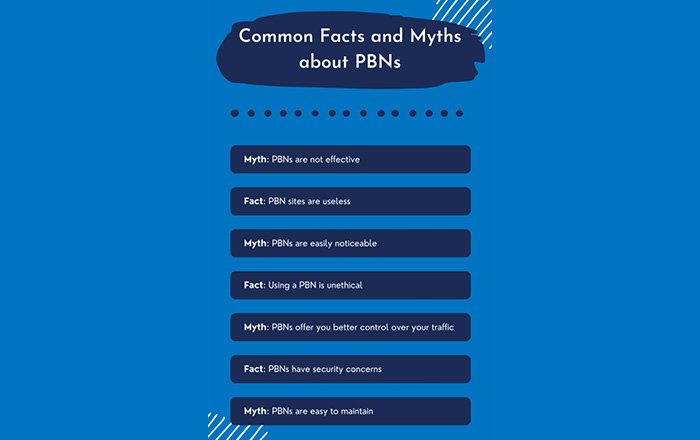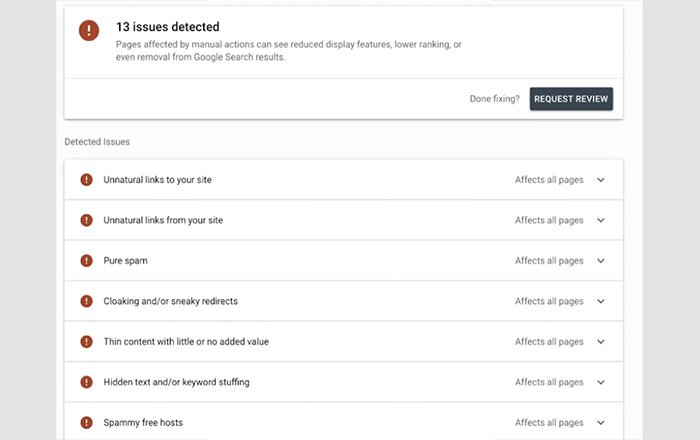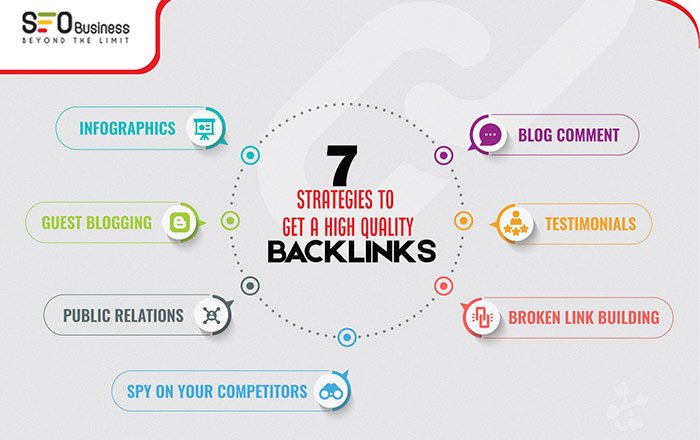Using PBNs, or Private Blog Networks, is an off-page SEO tactic which involves the external linking from a group of blogs (typically controlled by a single owner) to your website.
Such private networks were created primarily for boosting an individual or business’ visibility in search engines by sourcing backlinks from highly authoritative and quality sites.
Amidst multitudes of speculation and myths regarding this particular method of digital marketing, it is therefore necessary explore why PBNs cannot guarantee significant success and unveil some potentially damaging factors most people seem overlook when using PBNs in their SEO link building strategy.
Contents
Myths Surrounding PBNs

Myth 1: PBNs guarantee quick and easy SEO success
Myth 1 states that PBNs guarantee quick and easy SEO success which is a falsehood.
While it may seem like a good shortcut for organic ranking improvements, quick gains observed through PBNs are quickly reversed once search algorithms realize the fraudulent nature of what took place— penalization, and de-indexing ultimately follow shortly after resulting in immense losses with respect to keyword rankings and overall digital presence in competitive market niches.
Therefore, cultivating a successful online identity still requires effort and dedication when it comes to abiding by best practices and white hat methods of optimization.
Why?
Google is getting better at detecting black and even gray hat link building techniques.
Myth 2: PBNs are undetectable by search engines
Myth 2 surrounding PBNs is that they are undetectable by search engines. This incorrect assumption stems from the notion that computer algorithms can’t spot members of a PBN who are linked together, either through a shared server or other artificial techniques.
In reality, many brands display red flags which makes them visible to both search operators and bots. Search engine robots can detect patterns in Private blog network links which will easily uncover any ties between all the websites controlled by the same user or entity.
If these link structures come to light, this activity would be quickly flagged up for being suspicious and manipulated – potentially attracting an ever-growing set of penalties and deindexing as deemed necessary by Google’s algorithm corrections.
Using the Google search console, webmasters can identify unnatural links that might be considered link spam, ultimately harming their search rankings. It’s crucial to focus on building high quality links through legitimate means such as guest posts and blog posts rather than engaging in a link scheme that manipulates the link profile of your own websites.
Myth 3: PBNs are a cost-effective and sustainable long-term strategy
PBNs are a cost-effective and sustainable long-term strategy is a misconception. While the number of authoritative links does generate an uptake in online visibility it also carries more temptation to cut costs, leading to SEO fails in the future.
Having many sites connected would require some dedication and responsibility as PBNs lack basic privacy controls making them usually weaker when used to build links than organic means.
Furthermore, search engine algorithms that detect misuse or spammy content within these networks could endanger all online activity as well as a negative brand image if caught you may be subject to penalties and fines implying further financial burden while delaying overall success once discovered.
Unveiling the Risks Associated with PBNs

Risk 1: Potential penalties and deindexing by search engines
It is crucial to be aware of the possible risks of Private Blog Networks (PBNs). The greatest and most dire consequence when using PBN links is the potential for extensive penalties from search engines such as Google.
If a website is identified as having been built on or connected with a private blog network, punishment may come in the form of deindexing or delisting from relevant search engine pages, ultimately resulting in loss of traffic and thus revenue.
Additionally, overly considered SEO techniques carried out through questionable methods may result in further detriment to user reputation, site credibility, ranking on larger front pages, and overall consumer trust.
Risk 2: Negative impact on website reputation and credibility
Running PBNs comes with a variety of risks, including the potential to harm a website’s dollar and link earning power and public reputation.
Search engines like Google routinely postulate warnings against using them: doing so can incur the wrath of an algorithm change or penalty and flare up problems down the road for site owners, leaving websites rendered inoperable.
Links pointing to spammy sources exposes other sites to recommendations from dubious backlinks that can potentially damage their credibility on search engine pages and even lead to users losing faith in the legitimacy of their own operations.
One of the common myths in the SEO community is that PBNs provide high-quality links, but in reality, they often result in low quality links that do more harm than good. The risks involved in using PBNs include losing valuable link juice and the credibility of your original site, which can be better safeguarded by focusing on high quality content across different sites where you have more control.
Risk 3: Vulnerability to algorithm updates and changes
The third risk associated with PBNs is their vulnerability to algorithm updates and changes. Either due to actual penalties imposed by search engines or as a result of reduced visibility, multiple sites using PBNs are constantly at risk of derailing their success after major algorithm updates.
What may be beneficial for SEO today may become weighted differently in the near future, notifying that it could be necessary to continually modify methods in order to ensure site visibility after these modifications – something that does not always happen organically when relying mainly on PBNs as an optimization method.
Alternatives to PBNs

A. White-hat SEO strategies for organic growth
White-hat SEO strategies are a viable and sustainable alternative to PBNs and offer ethical, organic search engine optimization for businesses. Such strategies focus on methods like:
- Link earning through outreach and guest posting, optimizing website content for the best possible user experience,
- Investing in location-specific localization tactics,
- Posting a blog post on a frequent basis to increase customer engagement,
- Finding potential partners that could introduce you to their audiences easily,
- Running campaigns across various social media platforms with brand visibility as the main axis of commercial interaction online, etc.
With long-term gains promised through such practices; favoring these techniques up front demonstrate better value ROI than opting for short-term fixes through PBNs at any cost!
Building high-quality backlinks through outreach and guest posting
Building high-quality backlinks through outreach and guest posting is a more sustainable long-term SEO strategy that does not involve the use of PBNs. With effective outreach, you can contact websites and blogs with related content in order to form valuable relationships.
Placing quality links on these forms serves as an “advertisement” for your website, getting it seen by potential visitors. Guest posting on other related sites is also useful in this regard since you can include links to your own website on top of giving readers an insight into a specific topic while strengthening ties with another publisher.
Focusing on user experience and valuable content
Making user experience and valuable content a priority in link building tactic instead of Private Blog Networks (PBNs) provides several benefits for businesses as this approach offers an effective, sustainable strategy.
Developing quality, authoritative content that is attractive to customers will both increase domain authority and maximize visibility and searchability on search results pages.
Additionally, offering information support services or creating a well-designed website are other SEO tactics that can help attract inbound links from external sites. By creating useful and customized user experiences audiences not only become loyal customers but willingly share placed content among their social channels resulting in the further organic growth of your website.
To ensure long-term success through such practices, research cohort analysis surrounds competitors’ vulnerabilities while monitoring analytics must remain the focus that sustains success not just for verified efforts but available resources also.
Conclusion
It’s clear that Private Blog Networks (PBNs) are inadequate and unsustainable as an SEO technique. Several myths surrounding PBNs have been debunked–which include misleading claims of instantly successful SEO campaigns, guaranteed search engine detectability, and great cost effectiveness for long-term link building strategies.
Furthermore, it was discussed that PBNs carry significant risks such as search engine penalties and deindexing, reputational damage resulting from weak links built by the networks, and potential vulnerability to algorithm updates or changes causing traffic erosion.
Businesses who care about their reputation and strive for sustainable campaign growth should adopt sound alternative techniques such as white-hat SEO techniques, building high-quality and natural links through link outreach initiatives and targeting engagement metrics.
These are exactly the types of link building services we tell clients to avoid.
Tim has spent more than two decades in organic online marketing, working with some of the most well-recognized online brands in scaling their content marketing campaigns.
Connect with Tim on Linkedin & Twitter.
- How to Create More Linkable Content in the Age of AI - May 1, 2025
- Link Cost vs. Link Value: How to Balance the Equation - April 18, 2025
- Are Reciprocal Links Too Risky to Try? - February 21, 2025
